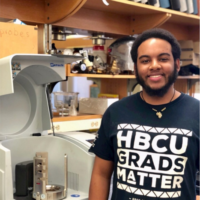By Marissa Shapiro
Vanderbilt University
The article calls for a thorough and quantitative approach to eliminating inequalities in STEM fields worldwide
August 17, 2020 — A group of 31 world-renowned chemists have come together to articulate the value of diversity in science, calling for a paradigm shift in the ways that the scientific community nurtures and values its marginalized members.
Isaiah Speight, a graduate student in the research lab of Professor of Chemistry Timothy Hanusa and national student representative of the National Organization for the Professional Advancement of Black Chemists and Chemical Engineers (NOBCChE), helped initiate and lead the effort.
In the context of a summer when a global pandemic is disproportionately hurting minority communities and the national conversation on racial justice is roiling, Speight considered how he could meaningfully participate in the conversation through a scientific lens.
With contributors from Austria, China, New Zealand, Nigeria and 10 other countries, including 2016 Nobel Prize winner for chemistry Sir J. Fraser Stoddart, the article calls for a thorough and quantitative approach to eliminating inequalities in science, technology, engineering and math (STEM) fields worldwide.
To get there, the group provides a framework for unified understanding, including defining the vocabulary of diversity and current reported data on representation in academia.
They also recommend stronger support networks for scientists vis-a-vis stronger mentorship, a revision of how excellence is evaluated and rewarded, and greater editorial participation in career-making publications (that also represent the interface between science and society).

The article, which came together via marathon video conferences across multiple time zones, delivers room for current community gatekeepers to transition their mindsets from exclusive to inclusive and gives voice to anyone who has ever considered themselves an “outsider” in their field.
A blog post summarizing the article can be found on the World Economic Forum blog, and a Q&A with many of the article’s co-authors has been posted to the Nature Research chemistry community page.
The article, “A diverse view of science to catalyse change,” was co-published in Nature Chemistry, Chemical Science, Journal of the American Chemical Society, Angewandte Chemie International Edition, Canadian Journal of Chemistry and Croatica Chemica Acta on Aug. 17.
“I worked with my extremely talented peers to write an article that is in support of who we are and what we want our futures to look like. Seeing it published in journals that I hold in such high regard is an out-of-body experience,” said Speight, whose focus in the lab is on making chemistry more environmentally friendly by developing processes that do not require the use of hazardous solvents. “We are working to make our community a more inclusive place. That so many others believe and agree with the ideology that everyone deserves an equal shot at being a part of the world of science is very meaningful to me.”
By becoming high-ranking visible members of their fields, diverse scientists can normalize a greater variety of ideas and approaches to science.
“This article has broader implications than just in chemistry, as the issues of inclusion that Isaiah and his co-authors raise are true throughout the sciences and many other fields,” said John McLean, Stevenson Professor of Chemistry and chair of the department. “This article is important for our colleagues not only to read, but to leverage its recommendations for meaningful change.”

“Watching Isaiah work so passionately to pull this all together has been nothing short of inspirational,” said Renã Robinson, associate professor of chemistry and president-elect of NOBCChE. “His tenacity and commitment to sharing ideas of the higher standards that we should hold ourselves to are the qualities that we need in our community. I look forward to continuing this important discussion with my colleagues and students.”
Speight completed his undergraduate education at Norfolk State University, a historically Black university (HBCU). Following his graduate studies, he is planning for a career at an HBCU where he can teach and mentor chemistry students so that they know there is a place for them in science.

“My goal is to help initiate conversations about diversity in the lab, between students and advisers or during a publication’s editorial staff meeting,” said Speight. “I believe our community is at the beginning of a shift. If our work can keep that momentum going, that is a victory.”











